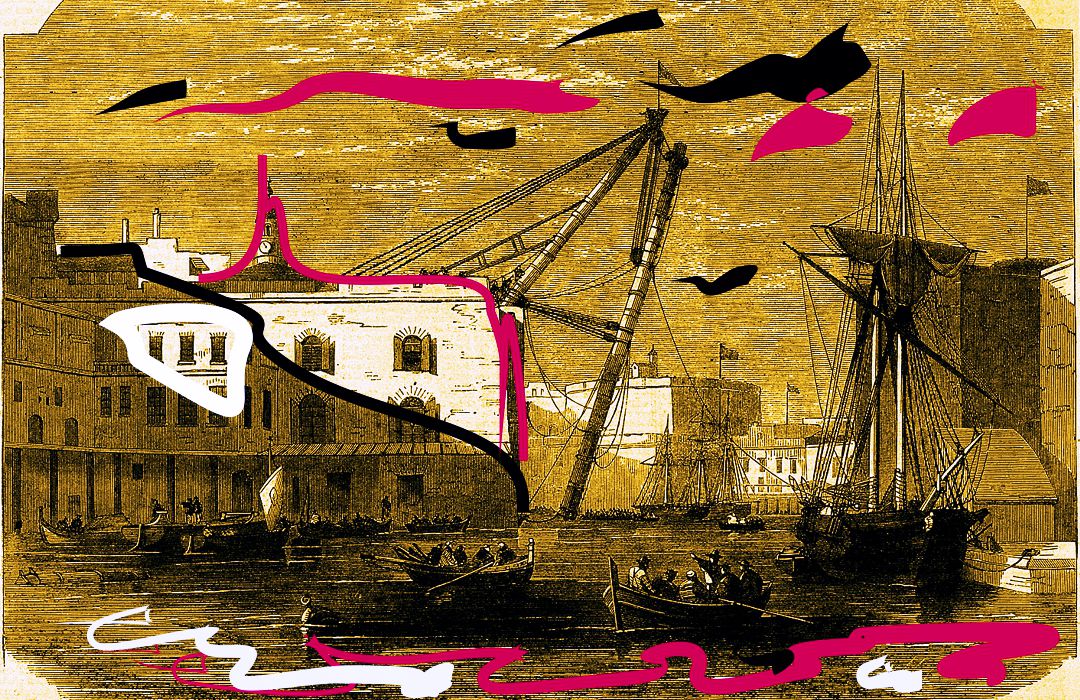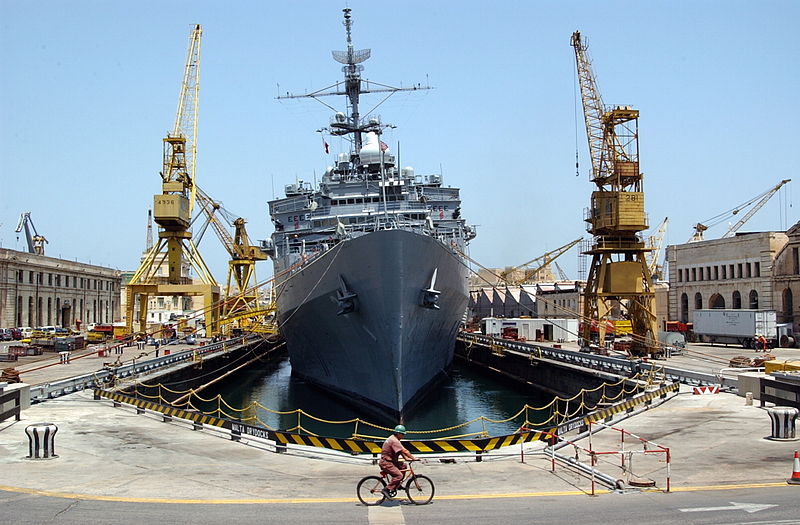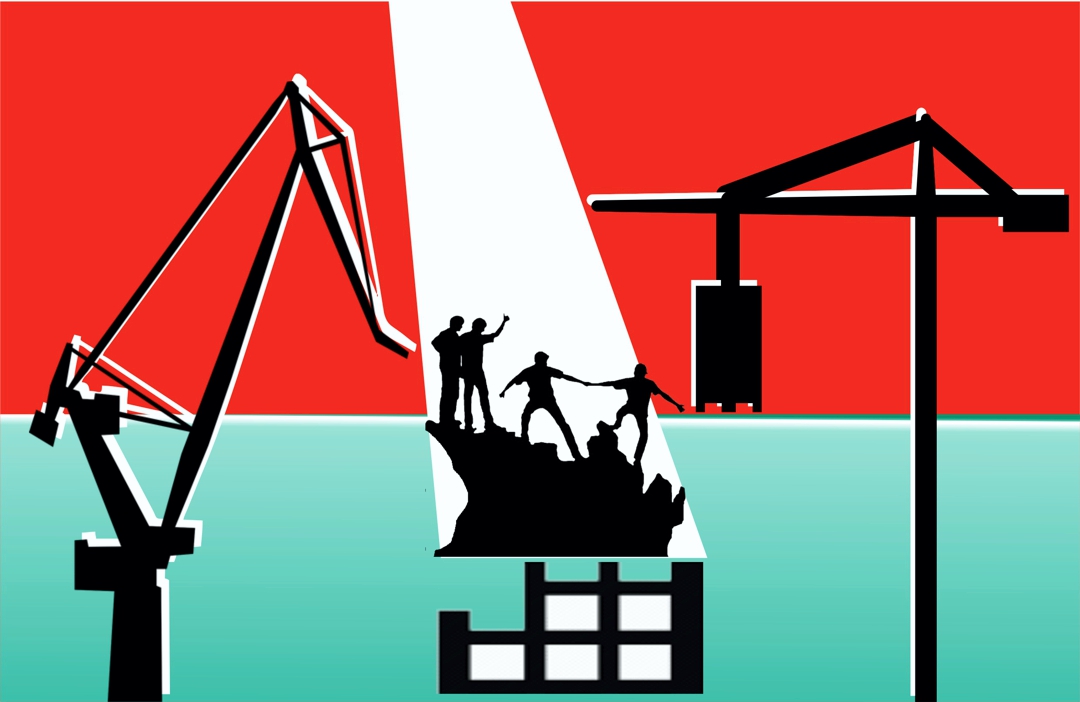
Recent developments in Malta’s economy and society are facilitating the emergence of a new—individualistic—work culture. Solidarity with fellow workers is being replaced by status awareness, individualism and prioritising of promotion prospects.
by Edward L. Zammit
Image: View of the Naval dockyard with heavy lifting gear, 1865. Source: Wikipedia (colorised, amended).
[dropcap]H[/dropcap]ow have the social and economic changes Malta experienced over the past decades affected workers? What changes are taking place in the traditional work culture? The term ‘tradition’ here is limited to the workers’ perceptions, values and behaviour which are often related to religion with its deep roots in Maltese society for generations. ‘Work culture’ refers to the ideas, meanings, values, symbols and norms which explain much of the people’s behaviour and interactions in work activity.
Traditional Culture of Humble Servitude
When national poet Dun Karm wrote the words ‘Rodd il-hniena lis-sid u s-sahha lil haddiem…’ in Malta’s national anthem, he was expressing some deep rooted values in the traditional work culture in Malta that also characterised for many years the paternalist interactions between workers and their employers. A few other proverbs also reflect similar attitudes. Like their counterparts in other countries, Maltese workers, even today, resort to proverbs which reflect their collective experiences and are transmitted from one generation to another.
Work occupies a central place in the life of the Maltese. Life, however, is seen as the classic valley of tears and the values of acceptance, resignation and modest expectations predominate. As a reward for ghaqal and bzulija, man will be fully rewarded in Heaven. In fact, too much earthly happiness, based on money and other possessions, is regarded as suspect and suggests dubious work activities. Money is the reward for hard work and has to be used with moderation. Saving for a rainy day, wherever possible, is also encouraged. That way a man also achieves his independent self-reliance—this work ethics is, indeed, a masculine concept.
The following communal sayings or proverbs exemplify the above:
- Il-bniedem ghax-xoghol mahluq [Humans are created to work]
- Alla lil min jitilqu jaghtih il kuntentizza minn did-dinja [God makes happy whomever He pleases]
- Ix-xemgha tixghel u l-purcissjoni wieqfa [The candle is lit and the procession is motionless]
- Xoghol u sabar sa gewwa l-qabar [Work and patience are a lifetime’s fate]
- L-ewwel l-obliggazzjoni imbaghad id-devozzjoni [Duty comes before devotion]
- Mix-xoghol tal-Hadd, jibza’ kulhadd [Everyone shies away from work on Sunday]
- Ix-xoghol kastig tad-dnub [Work is a punishment for sin]
![]()
The interactions between workers and employers stress the values of submission, humility, and deference. The need for cooperation between rich and poor generally stand out. The overall image is that of a static social order where everyone’s place is pre-ordained from birth and there is little that can be done, individually or collectively, to change the social order. Yet there are also some cynical attitudes towards the administration of justice, scorn and resentment for the idle rich who are often seen as exploiting the poor, and, consequently, suggestions of conflicting interests between rich and poor. There are also hints of the need for individual manipulations and resort to the patronage system if one wants to get ahead in life.
The following sayings exemplify this attitude:
- Is-swaba fl-id mhumiex imdaqqsin l-istess [Even a hand’s fingers have different sizes]
- Li jien kont Amir u int kont Amir, min isuqu l-hmar? [If everyone were a Grandee, who would steer donkeys?]
- Tobzoq ghas-sema u jigi f’wiccek [Spit at the sky and your own spittle will come down on you.]
- Hu kollox minn idejn Alla [Accept whatever befalls since it is willed by God]
- Hanqa ta’ hmar qatt ma telghet is-sema [A donkey’s lament will not make it to heaven]
- Is-sinjuri jithaddtu u jiddiehku, hobzhom mahbuz u zejthom fil-kus. [The wealthy chat and laugh, and need not bother about earning a living]
- Minghajr qaddisin ma titlghax il-genna [Without interceding saints, no one will make it to heaven]
![]()
Clearly, many of the above attitudes and values are not much in evidence nowadays. The process of industrialisation was accompanied by profound changes in Maltese society including changes in people’s orientations towards work and the accompanying social relations.
But more recent studies, too, have shown that some aspects of the ‘Maltese work ethic’* continue to prevail at least among some categories of workers. This includes personal pride and self-identification with one’s work together with a moral obligation to perform one’s duties responsibly and professionally, as well as a degree of ‘compliance with paternalism’—particularly among employees in small and medium sized enterprises and the self-employed.
Emergence of a new Working Class Culture
Industrialisation came to Malta at a relatively early stage of the modern era. During the second half of the nineteenth century, when industrial development was rapidly transforming military and naval technology, Britain began making full use of Malta’s strategic position in the Mediterranean Sea and its port facilities as part of its global imperial strategy. The importance of Malta for Britain was greatly enhanced after the opening of the Suez Canal in 1869. From then on, Malta became an important depot centre on the way to India and the Far East.
The presence of a large fleet in Malta’s harbours necessitated the construction of the dockyard for the repair of steam ships which, in turn, led to the emergence of a concentrated group of skilled industrial workers. The wages, working conditions and general living standards of these workers were very low at that time and the living conditions of most Maltese families were abysmal. At the dockyard, most Maltese workers were in daily contact with their British counterparts, some of whom were actively involved in trade union and political activities in Britain—at that time, the idea of international working class solidarity was popularly endorsed by members of the British labour movement.
Under their influence, a number of Maltese dockyard workers were inspired to commence similar activities in Malta and eventually, these played a leading role in the establishment of the first local trade union in 1885. The union was aptly called The Imperial Workers’ Union, and had Henry Ear, an Englishman, as its leader. A number of Dockyard workers also played prominent parts in the political activities of the time as followers of Manwel Dimech (the Dimechiani) and as activists in the Reform and Constitutional Parties—a predecessor of today’s Malta Labour Party.
Under influence or their British colleagues, a number of Maltese dockyard workers established the first local trade union in 1885.
Despite the British influence, however, the ideological justification for the actions of the Maltese trade union and political leaders at that time continued to reflect the local, traditional work culture. The Dimechiani, who upheld radical, anti-clerical ideas were in a minority.
In fact, one main source of inspiration was found in the Encyclical Letter Rerum Novarum of Pope Leo XIII, published in 1891. While this document proclaimed the right of workers to join trade unions and to carry out their business, they must always be guided by the principles of social justice as expounded by the Church. On this basis, the leaders of Malta’s working class went to great pains to declare their orthodox, Catholic and anti-communist credentials (Marx’s writings were officially banned in Malta).
A number of prominent members of the clergy also took their place for a time among the leaders of both the union and party. Likewise, the close collaboration between the trade union and political leadership continued over the years and a number of Dockyard workers played a leading role in both. The relationship was consolidated after World War II, with the establishment of the General Workers’ Union and the reorganisation of the Labour Party, as the dominant union and political party of the labour movement in Malta. The close collaboration between the union and the party reached a peak during the 1977–88 decade when, under the influence of Dom Mintoff, the two organisations declared a statutory fusion.

Over the years, workers’ original cordial relations with the Church cooled down considerably. These relations deteriorated to the extent that historically there were two major rifts. The first occurred during the 1930’s and the second, a much deeper one with long-lasting effects, happened during the 1960’s.
Among the main contributing factors for the breakdown of relations with the Church were the influence of a militant group within the Labour Party who were keen to establish Malta as a secular state and to limit the dominant power of the Church in social life. This group was explicitly anti-clerical and their leadership explicitly espoused a ‘socialist’ ideology. Some of these were the successive followers of Manwel Dimech (1860—1921) a self-taught working class reformer who came into conflict with both the Church and the British authorities and who ended his life exiled in Egypt.
By the 1960s, partly as by-product of the rift with the Church, a hard core group which espoused the characteristics of working class consciousness emerged. They acted as a coherent group, conscious of their potential as an agency of radical social change in pursuit of their own collective interests. They regarded conflict with the other opposing groups as inevitable. They also tended to regard religion at best as a distraction from their political goals and at worst as allied with their opposing social classes.
By the 1960s, partly as by-product of the rift with the Church, a hard core group which espoused the characteristics of working class consciousness emerged.
It should be noted, however, that although this militant group eventually gained the upper hand within the Malta labour movement, they only managed to dent rather than to totally uproot Malta’s dominant work culture **. During the peak of the political—religious disputes many workers actually deserted the labour camp while the others who stayed often felt torn by an internal crisis of conscience. It was only after an agreement was formally reached with the Church that the Labour Party could return to power in the 1971 election.
Yet important departures from the traditional work culture were taking place over the years as other factors also contributed to bring about social change. These factors included the prolonged period of economic growth which followed independence in 1964, and the tangible improvements in working conditions and social welfare benefits which were often the outcome of policies and actions endorsed by the labour movement. These policies resulted in increasing affluence and widespread social mobility as well as in the establishment of consumer values as a way of life.
Working Class and Work Ethics Post EU Accession
The social changes which have been taking place over recent decades have accelerated since Malta’s EU accession in 2004 and the more recent return to power of the Malta Labour Party in 2013—with the resultant, current economic prosperity.

Since the economy has been restructured in line to meet the demand of global markets, the profile of Malta’s working population has been changing significantly, too. As a result, by now it is virtually uncomparable to what was only a few decades ago. In place of a largely male workforce engaged in public entities, heavy industry and manufacturing, currently the services sectors—finance, tourism, ICT and gambling—predominate. Simultaneously, some light manufacturing industry has also been maintained particularly the production of electronic components and pharmaceuticals.
Overall, the expansion of higher education has resulted in a better qualified workforce. And as there are now more females than male students at the university and other higher educational institutions, the feminisation of Malta’s workforce has been accompanied by its gentrification. The rapid economic expansion has also raised the demand for foreign workers both from EU countries and from further afield.
Another feature is the presence of migrant workers from African and Asian countries, many of whom work in construction and other manual occupations for which local workers are unavailable.
Changes in Malta’s economy and society are facilitating the emergence of a new—individualistic—work culture.
A liberal economic model introduced by successive Nationalist Party administrations and adopted by the Labour government promoted a culture of debt that had not been present in Malta. Living a life beyond one’s means, with high levels of debt was seen as irresponsible and frowned upon in traditional working class culture. Reliance on debt fosters an individualistic relation to work and career, as well as prioritisation of commodities over civic duties and relationships.
Thus, these developments in Malta’s economy and society are facilitating the emergence of a new—individualistic—work culture. Solidarity with fellow workers and high regard of trade unions are being replaced by status awareness, individualism and prioritising of promotion prospects.
Will there be a possible basis for organising these widely different sectors of Malta’s current workforce? Gentrified and gentrifying workers in the service sector and the builders of their potential new homes, the construction workers with a migrant background?—A new working class consciousness would have to evolve with a strong awareness of the functioning of the economic system and a culture of solidarity.

* Zammit, E., (1994), ‘Maltese orientations to work’, in Sultana, R.G., Baldacchino, G. (Eds),Maltese Society. A Sociological Inquiry, Mireva Publications, Malta, pp.483-504.
** E. L. Zammit: A Colonial Inheritance – Maltese Perceptions of Work, Power and Class Relations. Malta University Press, 1984.
![]()
Edward Zammit is full professor of industrial sociology and industrial relations in the Faculty of Economics, Management and Accountancy at the University of Malta.
Leave a Reply